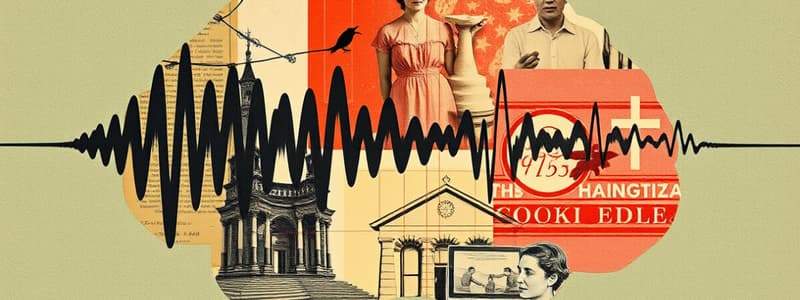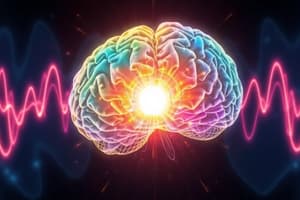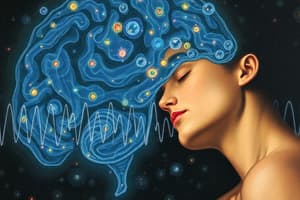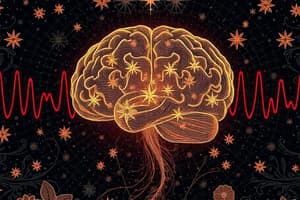Podcast
Questions and Answers
What are alpha waves?
What are alpha waves?
- Low-amplitude, slow, synchronous waves (correct)
- High-amplitude waves when the reticular activating system is damped
- Rhythmic, more irregular waves
- Common in children; abnormal in adults
What state of mind do alpha waves indicate?
What state of mind do alpha waves indicate?
Awake but relaxed
How are beta waves characterized?
How are beta waves characterized?
- Deep sleep waves
- Low-amplitude and slow
- Common in children
- Rhythmic and more irregular (correct)
Beta waves represent an awake and alert mental state.
Beta waves represent an awake and alert mental state.
What is the main characteristic of theta waves?
What is the main characteristic of theta waves?
Theta waves are common in children and abnormal in adults.
Theta waves are common in children and abnormal in adults.
What are delta waves associated with?
What are delta waves associated with?
Delta waves are present during wakefulness.
Delta waves are present during wakefulness.
What device is used to measure brain waves?
What device is used to measure brain waves?
Brain waves change due to ______.
Brain waves change due to ______.
Flashcards are hidden until you start studying
Study Notes
Brain Waves Overview
- Alpha waves: Low-amplitude, slow, synchronous waves indicating a calm state.
- Characteristic of an awake but relaxed brain; often referred to as an idling brain.
Beta Waves
- Rhythmic and more irregular in nature.
- Associated with an awake and alert mental state, indicating active cognitive processes.
Theta Waves
- More irregular compared to alpha waves; suggestive of light sleep or relaxation.
- Common in children; presence in adults may indicate abnormal brain function.
Delta Waves
- High amplitude waves occur when the reticular activating system is damped, signifying deep sleep.
Measurement of Brain Waves
- Brain waves are measured using an electroencephalogram (EEG), a key tool for analyzing electrical activity in the brain.
Factors Affecting Brain Waves
- Brain wave patterns can change due to age, sensory stimuli, brain diseases, and the chemical state of the body.
Studying That Suits You
Use AI to generate personalized quizzes and flashcards to suit your learning preferences.




